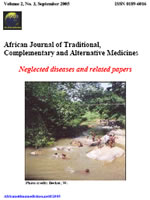
|
African Journal of Traditional, Complementary and Alternative Medicines
African Ethnomedicines Network
ISSN: 0189-6016
Vol. 11, No. 2, 2014, pp. 458-463
|
 Bioline Code: tc14068
Bioline Code: tc14068
Full paper language: English
Document type: Research Article
Document available free of charge
|
|
|
African Journal of Traditional, Complementary and Alternative Medicines, Vol. 11, No. 2, 2014, pp. 458-463
| en |
RESTORATION OF GLUTAMINE SYNTHETASE ACTIVITY, NITRIC OXIDE LEVELS AND AMELIORATION OF OXIDATIVE STRESS BY PROPOLIS IN KAINIC ACID MEDIATED EXCITOTOXICITY
Swamy, Mummedy; Norlina, Wan; Azman, Wan; Suhaili, Dian; Sirajudeen, K.N.S.; Mustapha, Zulkarnain & Govindasamy, Chandran
Abstract
Background: Propolis has been proposed to be protective on neurodegenerative disorders. To understand the neuroprotective effects of honeybee
propolis, glutamine synthetase (GS) activity, nitric oxide (NO), thiobarbituric acid reactive substances (TBARS) and total antioxidant status (TAS)
were studied in different brain regions- cerebral cortex (CC), cerebellum (CB) and brain stem (BS) of rats supplemented with propolis and subjected
to kainic acid (KA) mediated excitotoxicity.
Materials and Methods: Male Sprague-Dawley rats were divided into four groups; Control group and KA group received vehicle and saline. Propolis
group and propolis + KA group were orally administered with propolis (150mg/kg body weight), five times every 12 hours. KA group and propolis +
KA group were injected subcutaneously with kainic acid (15mg/kg body weight) and were sacrificed after 2 hrs and CC, CB and BS were separated
homogenized and used for estimation of GS activity, NO, TBARS, and TAS concentrations by colorimetric methods. Results were analyzed by oneway
ANOVA, reported as mean ± SD from 6 animals, and p<0.05 considered statistically significant.
Results: NO was increased (p< 0.001) and GS activity was decreased (p< 0.001) in KA treated group compared to control group as well as propolis +
KA treated group. TBARS was decreased and TAS was increased (p< 0.001) in propolis + KA treated group compared KA treated group.
Conclusion: This study clearly demonstrated the restoration of GS activity, NO levels and decreased oxidative stress by propolis in kainic acid
mediated excitotoxicity. Hence the propolis can be a possible potential candidate (protective agent) against excitotoxicity and neurodegenerative
disorders.
Keywords
Nitric oxide; Glutamine Synthetase; Oxidative Stress; Excitotoxicity; Propolis; Rat Brain
|
| |
© Copyright 2014 - African Journal of Traditional, Complementary and Alternative Medicines
Alternative site location: http://journals.sfu.ca/africanem/index.php/ajtcam
|
|
